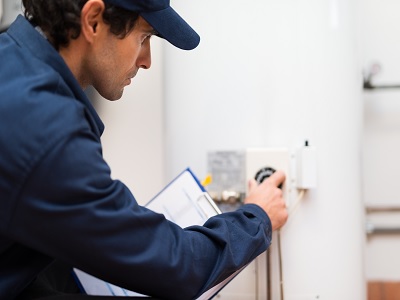
Did you know that heating water can account for nearly 20% of your home’s energy bill? Heating water takes more energy than any other household task. You’ll feel the effects even more if your water heater isn’t working as intended.
Inefficient water heaters perform less than they should and can cost you more each month. This is a losing situation that can only get worse over time. There are some proven ways to increase the efficiency of your water heater. These five easy projects can make your water heater more efficient and help you save money:
Step 1: Drain Water Heater Sediment
Minerals like calcium and magnesium build up over time in your water heater tank. These minerals settle to the bottom of your tank, hardening and forming sediment. The sediment can cause your system to work harder to heat your water. Overworking your water heater can lead to ruptures and overheating. Water heater sediment can be easily removed by draining the tank completely and flushing it with cold water once a year to maximize efficiency.
Eliminating sediments from your heater will make it run more efficiently and help prevent costly repairs. Flushing your water heater can be done easily by anyone with the right tools. It is possible to hire a professional plumber in Myrtle Beach to flush your water heater as part of larger water heater maintenance calls.
Step 2: Insulate water pipes
The heat tends to quickly dissipate, especially in pipes and water tanks. This is normal, but it can also cause your water heater to not heat as efficiently as it should. To compensate for heat loss in your pipes, you will need to heat more water. Your water heater will use more energy if you heat more water. This will result in higher electric bills. Insulating water pipes reduces heat loss and increases efficiency. Insulating your pipes will ensure that heat does not escape from the system. You could also switch to a tankless water heater to skip this step.
Step 3: Use low-flow fixtures
Low-flow plumbing fixtures can be another way to save money over time, and without requiring too much effort or time upfront. Low-flow fixtures reduce water flow so less hot water is wasted. Traditional fixtures can be replaced with Low-flow faucets and shower heads to save up to 50% on your water consumption. These are more expensive upfront, but they will save you money in the long term, especially if your family member is notorious for taking hot, long showers.
Step 4: Set your Water Heater to 120 Degrees Fahrenheit
It’s a fact that every water heater comes with a thermostat built in. The thermostat tells the system how hot it needs to heat water in the tank. Your system’s heat output will determine how hot your water is. The longer your system runs, the more energy it uses. You should change the thermostat setting on your water heater if your hot water becomes too hot or appears dangerously hot. Your water bills will be lower if you turn down the thermostat, preferably 120 degrees Fahrenheit.
Step 5: Fix Plumbing Leaks
Water heater leaks often begin at the heater itself. Check around the tank of your water heater for visible leaks. These leaks could be caused by the temperature-pressure relief valve or drain valve. Temperature-pressure relief valves can leak to release pressure, as intended, or simply because they are faulty. Also, check the water pipes around fixtures such as sinks and showers. For assistance in detecting or fixing plumbing leaks, contact your local plumber.
Call Blue Ribbon Plumbing if you need help with water heater installation, repair, and maintenance. You may also reach out to us for other plumbing needs. Contact us today!
Like our Facebook page for more great info about plumbing services.
Blue Ribbon Plumbing LLC
4201 Carolina Exchange Drive Suite 202
Myrtle Beach, SC 29579
(843) 267-9733
https://www.blueribbonplumbingmb.com/
Serving all of Horry County including Myrtle Beach, North Myrtle Beach, Little River, Murrells Inlet/Garden City, Surfside Beach, Carolina Forest/Forestbrook, Conway/Aynor
No comments:
Post a Comment